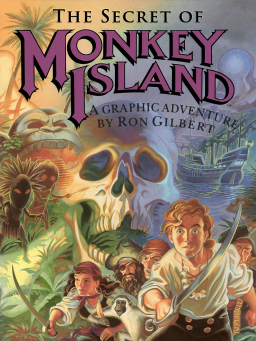For today's review, I decided to play through one of my favourite games from my childhood, The Secret of Monkey Island. I'd not long had my Amiga 500 computer, and, this was first point-and-click adventure game I'd ever played, I remember being absolutely enthralled at the story, design and narrative. It was like an interactive novel that was funny, engaging and required a fair amount of thought as to where to go and what to do next (you couldn't just go online and Google for a solution!).
The game focuses on the character of Guybrush Threepwood, a young (practically pubescent) man who has arrived on Melee Island in a bid to realise his dreams of becoming a swashbuckling pirate. Things don't go quite according to plan, and Guybrush finds himself embarking on a series of adventures across the Caribbean where he crosses paths with all manner of scurvy pirates, voodoo magic and much more besides.
The player interacts with characters and objects in the world by selecting a verb from the list at the bottom of the screen, then clicking on the object in the world. Naturally, part of the game's challenge is working out which actions to perform on each object in order to drive the story forward; quite often, the solutions to some of the games puzzles aren't immediately obvious and there's a great sense of satisfaction in discovering the right combination and seeing the outcome.
A large part of the game's appeal is down to the writing and script, courtesy of Ron Gilbert, Tim Schafer and David Grossman. The character dialogue is, in my opinion, very well written and directed - not only must the text be broken into chunks that can phsycially fit on the screen, but must also make sense and remain engaging at the same time.
Another reason why I'm such a fan of Monkey Island is, unlike other adventure games, you can't actually die. Sierra and other developers would often kill off the player for making wrong choices, or for not reacting quickly enough in certain situations; extremely frustrating if you hadn't saved your game for a while. In fact, Gilbert and co. take a sly dig at other developers for this fact during the third act (see video at 2:33:46) in a great little Easter egg that I didn't even realise existed!
I know that the game has been re-released in various guises of the years, most recently with the full talkie special edition released on Steam (which I also own). Whilst I really do enjoy the voice acting in those versions, particulay Dominic Armato as Guybrush, Monkey Island was created in an era when full voice-over recording wasn't possible and I think part of the magic about the games comes from the fact you had to read the text and use your imagination as to how the characters sounded, much in the same way when reading a book.
Watch closely and you'll notice some great attention to detail and very smart use of some pretty basic techniques used by the designers to make the characters feel even more human. Some great examples include the point where Guybrush politely asks Captain Smirk if he'd put out his cigar, or the way the music stops abruptly when Guybrush calls the pirate leaders a bunch of foul, grog-swilling pigs. I think these nuances are problably lost on a younger audience and it wasn't until I'd played it through again today that I appreciated the lengths the developers went to to create such a great sense of pace and delivery.
In terms of visuals, the PC VGA version runs at a resolution of 320 x 200 and boasts an improved colour palette, giving the artwork greater vibrancy. I think that special mention must be given to the artists who created the close-up artwork for the characters faces during certain scenes. These are highly detailed, lifelike, but also possess a painting-like quality about them that looks great.
We then come to the main reason I chose to play this particular version, the Roland MT-32 audio. In an era before CD audio, the MT-32 really was the gold-standard in PC music reproduction at the time and it's easy to see (hear?) why; it really brings Michael Land's score to life and is simply brilliant.
It's a sad fact that, having played through these older games so many years later, a combination of poor mechanics and high difficulty tends to dull the somewhat rose-tinted memories I have of these titles. Therefore, it's a rare treat to play through a game that is as entertaining to play today as it ever was and, despite the slightly pixellated visuals, does not feel like a game that's approaching 30 years old.
Effectively shuttered in 2013, LucasArts no longer exists as a development company. However, games like Monkey Island are testament to the company's legacy as one of the best games development studios in history, and the creative brilliance of the people who worked there; they may be gone, but are certainly not forgotten.


No comments:
Post a Comment